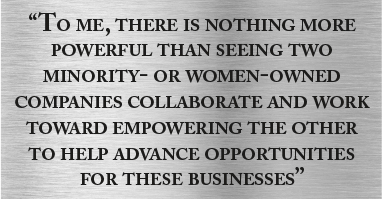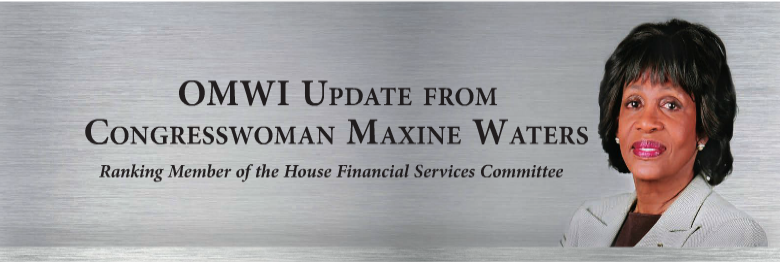As part of NAWRB’s commitment to bring women’s diversity and inclusion to the forefront, Congresswoman Maxine Waters provides an OMWI update:
NAWRB: Throughout your career protecting the consumer has been a very important priority for you. Can you provide an update on the Dodd-Frank Wall Street Reform and Consumer Protection Act since our last conference October 2014? What is the most important benefit this act is affording the typical American consumer?
Congresswoman Waters: Consumer protection has been, and continues to be, a top priority for me here in Congress. During my time as Member and now Ranking Member of the Committee on Financial Services, I’ve come to understand how critical consumer issues are for the average American. In the run-up to the 2008 financial crash, our financial system was riddled with loopholes and opaque shadow markets, which allowed the worst actors to reap financial gains on the backs of America’s middle class. In the end, we saw the financial crisis decimate our economy, destroy nine million jobs, and displace 11 million American families. In response, Congress passed the Dodd-Frank Wall Street Reform and Consumer Protection Act (The Dodd-Frank Act), to end this sort of behavior in the financial services sector, and provide rules-of-the-road to prevent another crisis from happening again.
This past July was the fifth anniversary of the passage of the Dodd-Frank Act. As one of the most comprehensive reform measures enacted in modern history, it has empowered Wall Street “cops-on-the-beat” by equipping them with critical enforcement tools, brought greater transparency to the once-opaque banking activities that helped cause the crisis, and given regulators direct mandates to ensure the future stability of our financial system. The Dodd-Frank Act also established the Consumer Financial Protection Bureau – the first agency of its kind specifically designed to monitor and provide critical consumer protections that were absent in the run-up to the crisis. To date, the CFPB has delivered more than $11 billion in relief to 25 million American consumers, empowering consumers within our financial system like never before.
In spite of this progress, there has been a sustained effort to dismantle and delay key portions of the measure by opponents of these reforms. And Democrats on the Financial Services Committee have come together to successfully defend against such changes, thus ensuring that critical protections included in the reform law remain intact.

NAWRB: Recently, federal agencies issued the final interagency policy statement establishing OMWI standards for the entities they govern. This is a great development for minority and women inclusion. Now that the standards have been established, what would you like to see happen next for the OMWIs?
Congresswoman Waters: Section 342 of the Dodd-Frank Act directs the Agencies’ OMWIs to develop standards for assessing the diversity policies and practices at regulated entities. Congress included Section 342 in The Dodd-Frank Act, in part, as a means of promoting workforce and supplier diversity within the financial services sector, and monitoring financial institutions’ efforts to achieving more equitable representation in the industry.
In order to ensure that Congressional intent on this matter was clear, I, along with Congresswoman Beatty, a Member on the Financial Services Committee and leader in the implementation of Section 342, and most of the Democratic Committee Members who helped to draft the provision, wrote to the Agencies’ expressing support for and opposition to views that stakeholders had submitted to the regulators in response to the draft proposed statement. In this letter, we described in great detail the need for consistent metrics, mandatory collection and public disclosure of diversity data from regulated entities to satisfy both the spirit and letter of Section 342.
I understand that NAWRB submitted comments to the Agencies, recommending that the OMWIs develop more prescriptive standards with “teeth” to ensure that they actually serve as an advocate and a resource for minority- and women-owned businesses seeking to work with federal agencies and the regulated entities.
I was disappointed with the approach taken by the Agencies in their final interagency statement. As we all know, the financial services industry has long fallen short when it comes to workforce inclusion and supplier diversity, and Agencies’ standards are a missed opportunity for the Federal government to address this persistent shortcoming. The final standards are fraught with ambiguity, by making participation in diversity assessments voluntary, directly ignore the unequivocal Congressional intent of Section 342, and ultimately further inhibit public access to the information contained in the assessments regulators do receive.When it comes to providing the sort of transparency and clarity the industry needs to help solve diversity challenges, these standards fail to establish uniform criteria for assessing workforce and supplier diversity, and make meaningful oversight and cross-industry comparison virtually impossible.

NAWRB: How would you suggest that inattention or disregard of the interagency OMWI standards be dealt with? What are the best ways to encourage entities to employ these minority and women inclusion policies and practices?
Congresswoman Waters: I believe it is critical for advocates, minority- and women-owned suppliers, and those who support them in Congress to continue to press the Agencies and the entities they regulate to improve and increase inclusion and supplier diversity within the industry. Congress has the ability to exert oversight authority over both the public and private sectors to ensure that addressing diversity in the financial services industry remains a top priority. And Democrats on our Committee are committed to doing everything possible to make diversity an integral part of any oversight work we conduct.
It is also imperative that we continue to encourage and challenge the industry to work with Federal regulators, state and local governments, diversity experts and academia to develop deep pools of diverse employees and contractors to help enrich current financial dialogue. This will ensure that there are not only diverse perspectives to help shape the direction of the industry, but also ensure that these historically disadvantaged businesses have the opportunity to grow and be successful.
Now, more than ever, it will be up to us to form coalitions to advance the conversation around diversity, both by highlighting those entities that are making good faith efforts to address diversity and inclusion, and by also shining a light on those firms that need to do more to achieve the sort of diversity that truly reflects the changing demographics of American society.
NAWRB: The OMWIs are forging crucial progress within federal agencies, progress that unquestionably trickles down to the general public. In your opinion, how does Section 342 of Dodd-Frank affect and help the average American?
Congresswoman Waters: One of the issues that became apparent at Congress during the Great Recession and as Congress worked to craft the Dodd-Frank Act was that the importance of diversity was not a priority, but an afterthought, to many in the financial services industry. With our nation’s changing
demographics, diversity needs to be an integral part of their operational and strategic goals of financial services institutions if these companies hope to compete and thrive in the future. Similarly, financial services agencies will need to attract and retain diverse personnel and suppliers to ensure that they are prepared to compete in diverse and emerging markets. And so, private and public sector efforts to increase diversity, through approaches like Section 342, are absolutely critical to sustaining and growing our economy.
NAWRB: NAWRB’s annual conference is focused on providing women with useful tools for the success and growth of their businesses. What are other important resources women may not be aware of, but should take advantage of in their careers?
Congresswoman Waters: One of the greatest tools we all fail to truly leverage is our networks. To me, there is nothing more powerful than seeing two minority- or women-owned companies collaborate and work toward empowering the other to help advance opportunities for these businesses. Conferences, like NAWRB’s annual one, present an excellent opportunity to spur ideas and collaboration that can ultimately transform the trajectory of a business.
It is also critical for minority- and women-owned businesses to interact with the OMWIs. They need to make sure the OMWI Directors understand the difficulties or challenges these businesses face to ensure the OWMIs are effectively focusing their resources to expand opportunities for disadvantaged populations. Women business owners should take advantage of anytraining opportunities, webinars, and outreach efforts from trade organizations and business-oriented organizations in their communities to continue to lend their voice to conversations around legislative, regulatory and public spaces. Too often, we allow others to dictate business needs and priorities and we miss out on opportunities to influence change because we are unaware or absent when our perspectives are needed most.
NAWRB: How do you envision American workplaces in 20 years? Specifically, what would you like to see the current diversity and inclusion efforts achieve? What is the best way to ensure that diversity and inclusion continues to thrive in the future, and not fall by the wayside in the next 20 or 30 years? What more needs to be done, what other offices and initiatives must be instituted to ensure this?
Congresswoman Waters: The financial services industry has historically struggled to create opportunities for upward mobility and representation for minorities in the workplace, and with respect to supplier diversity. According to a 2013 Catalyst Census, women account for less than one in five of all executive officers in the finance and insurance industries. In the securities and investment banking industries, in particular, men hold more than 80 percent of the executive positions. These statistics underscore the very basis for, and importance of, the establishment of Section 342.
Twenty years from now, my hope is that this industry
reflects what America truly looks like; where diverse perspectives are valued and encouraged as a core component for a given company’s success. In such a world, considerations for the effects on the plurality of the public will influence decisions in boardrooms, and in initial public offerings for minority and women-owned companies.
Ideally, in the financial services sector, women-owned investment firms will mentor other smaller women-owned firms to expand opportunities for firms to grow and support each other, while also showcasing what a fair and inclusive work environment looks like – they may even receive media attention for it.
And so, yes, we’ve made strides, but it is our responsibility to keep working until all communities have the access and opportunity they need to build and sustain wealth. Section 342 helps that effort, and I am confident that if all parties, public and private, work together we can get there.
To view the original article please see our magazine titled “Economic Growth” Vol 4, Issue 5 by Clicking Here

 Login
Login

